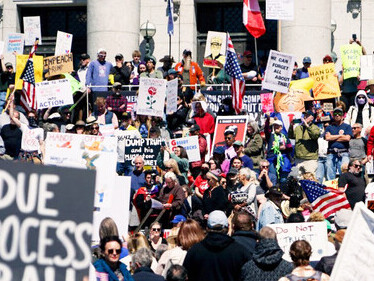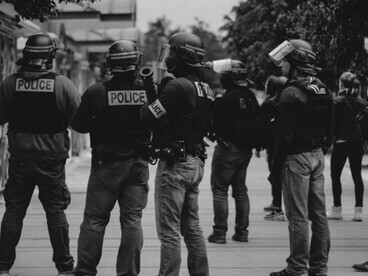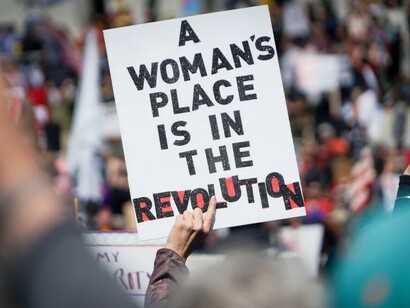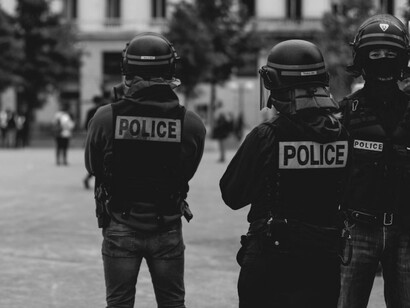There couldn't be a more obvious example of a fascist social and political movement about to take power.'
(Jason Stanley, political science and philosophy professor at Yale University)
Mere hours after his inauguration as the 47th President of the United States, Donald Trump, comfortably sitting in the Oval Office, took a decisive step in dismantling decades of human rights policies. Executive order after executive order, the Trump administration stripped millions of Americans of basic rights, ranging from sexual and reproductive rights and access to education to protection from systemic abuse. Although this stance hardly comes as a surprise after a campaign built on fearmongering, some experts go one step further: more than a far-right movement, Trumpism would be a fascist movement.
But what does that mean? Fascism has become a buzzword, used to describe a wide array of political regimes and ideologies. Born out of the 1920s, post-war Italy, fascism relies on a form of extreme nationalism, a conception of racial purity, and a strict social hierarchy. Much like other totalitarian regimes, fascist factions believe in the supremacy of the nation over the individual, the reorganization of society around a moral code, and the repression of political opponents.1.
At its core, fascism relies on an imagined "nation" that subsumes individuals as parts of a bigger entity, negating their agency and singularity in the process. It therefore comes as no surprise that Donald Trump's administration does everything in its power to dismantle rights earned by minorities, which bear a greater focus on personal identity and diversity. The vocabulary employed in official press releases seems to support this argument, describing DEI initiatives as "illegal and immoral discriminations 2."
Ever since his re-election, Donald Trump has intensified what can only be described as a war on diversity. Rollbacks on DEI initiatives, cutbacks on social and humanitarian aid programs, and discriminatory discourses in the highest echelons of the political chessboard are a few of the many symptoms of a clear setback to acquired civil rights. This radical stance has had wide ramifications for the public sector, where thousands of so-called "diversity hires" lost their jobs3, but also the private sector, with many multinationals such as Disney, Coca-Cola, Meta, or even Deloitte revising their own DEI policy to safeguard public contracts and subsidies from the American government.
Now, it is undeniable that Donald Trump has exerted a tremendous influence on American politics, polarizing and radicalizing public debates on fundamental issues such as immigration, LGBTQA+ rights, and healthcare. Comments that were deemed outrageous and unacceptable in the public arena are now tolerated under the guise of freedom of speech.
Is American democracy edging towards fascism? Experts may disagree, but I would argue that the current administration increasingly adopts traits that are usually attributed to fascist regimes. Building on the work of political scientists who dedicated their lives to studying the development of far-right networks in the United States, such as Cynthia Miller-Idriss and Jason Stanley, I purport that the government's current stance on DEI issues reflects the premises of a fascist enterprise. This "civilizational" project is characterized by two key features: a return to patriarchal values and the erection of an ethnostate.
The reaffirmation of strict gender roles
Gender politics and Republican rule have rarely gone hand in hand. If the reelection of a convicted rapist has proved one thing, it is that women's rights were not going to be reinforced under the current administration. Policy issues directly affecting gender and sexual minorities, such as reproductive health, LGBTQ+ inclusion, or gender equity, are rarely championed by Republican representatives, who deem it a waste of time and taxpayers' money. Patriarchal in nature, Donald Trump’s societal project will have severe repercussions on civil rights frameworks in the United States.
Beyond the flurry of sexist comments and behaviors broadcasted in mainstream media, Republicans have pushed for the overthrow of key legislation in civil rights. From the reversal of the Roe vs. Wade ruling to the ban on drag performances, American politics seems to increasingly inch towards a very binary definition of gender, tied to defined societal roles: men as providers and women as caretakers. In that regard, the recrudescence of pro-natalist discourses provides an interesting case study.
The appointment of pro-natalist figures like Malcolm and Simones 4 serves well in advancing this narrative. Their advocacy efforts have been welcomed by the current administration, which envisioned measures such as ''baby bonuses,'' granting a 5,000 $ subsidy for each child born by American, or the donation of a ''motherhood medal,'' an initiative popularized in the late 1930s by the Nazi regime. Donald Trump’s self-appointment as the “fertilization president” confirms the patriarchal nature of the current administration's societal vision. Altogether, proposals like these foster a sense of compulsory procreation; to safeguard America's prosperity, women must ''produce offspring.'' In practice, it translates to a restricted access to abortions and the suppression of sexual and reproductive health programs.
This division of labor and the strict societal role attributed to women and men leave no room for the expression of other gender or sexual identities. On the pretense of “family values,” Donald Trump has launched a vast witch hunt on the LGBTQA+ community, with a particular focus on transgender people. In the span of a few months, the American government banned transgender citizens from joining the military5, halted gender-transition procedures, and revised the passport policy to invalidate identities that lie outside of the binary definition of gender. Activists such as Hunter Schafer recounted on social media the ordeal they went through to acquire a new passport that reflected their chosen identity. Although these measures have been deemed unconstitutional by several federal judges, the sentiment is clear: the adherence to patriarchal values has become a prerequisite to American citizenship.
But far from being a public enterprise, the resurgence of fascist discourses also permeates the private sphere. In her book entitled ''Hate in the Homeland: The New Global Far-Right,'' Cynthia Miller-Idriss sheds light on the processes of radicalization that fuel far-right movements in the United States. She brilliantly shows how combat sports and online forums have become key channels through which far-right leaders spread hate, gaining new followers in the process.
Anyone who is chronically online like me may have stumbled upon the slew of influencers promoting a return to traditional values, emphasizing the so-called ''decadence'' of the modern era and the drift towards ''over-inclusive'' societal norms. From incels (involuntary celibates) to tradwives (traditional wives), social media are rife with examples of private individuals encouraging a return to a prior era, characterized by strict gendered roles. Mediatized figures such as Andrew Tate and the Paul brothers, who have faced criminal charges ranging from trespassing to human sex trafficking, are still lauded as thought leaders by a growing population of isolated, easily swayed men.
Altogether, these influencers reprise codes from the fascist agenda, such as the Nazi salute, featured at the beginning of every one of Andrew Tate's videos since Elon Musk performed one at Donald Trump's inauguration ceremony. The objective of such practices is clear: establish a social hierarchy founded on patriarchal virtues such as strength, privilege, and domination over women. They separate the American people into two categories: the insiders and the outsiders, the citizens that are "in, who adhere to the far-right's rhetoric and are therefore considered legitimate members of American society, and the ones that are "out," whose gender, sexuality, or origin precludes them from taking part in Trump's envisioned America. The same assessment applies to other social factors, such as race.
The far right's project of an ethno-state
As we have established, not everyone can be part of Donald Trump's ideal America. In her essay, Cynthia Miller-Idriss explores the spreading of far-right discourses in the United States, detailing the core tenets of far-right ideologies. One of these features is the establishment of an ''ethno-state,'' characterized by the restoration of a white homeland or, in other words, a polity defined on racial and ethnic grounds. All in all, this discourse promotes violent and expropriative actions such as ''re-immigration of ethnic minorities (...), forced removal from homes, seizure of private property, and separation of individuals from lands where their families have lived for generations6.''
With this definition in mind, it is hard not to be reminded of the recent crackdown on minorities in the United States. By weaponizing federal agencies such as the Immigration and Customs Enforcement (ICE) agency, Donald Trump has targeted thousands of families of immigrant descent, tearing them asunder in the process. Video footage of schools and private homes raided by ICE agents is easy enough to find on the Internet, proving that Trump's project was never pro-family, nor was it to build a cohesive and united America.
The vocabulary he employs to refer to immigrants proves as much. The 47th President of the United States' outbursts are well-documented, from referring to Mexican immigrants as "rapists" during his first campaign in 20187 to outwardly racist statements against the American Black electorate. These statements contribute to the expansion of the Overton Window, legitimizing racist comments and behaviors in the public arena.
But aside from the discriminatory nature of Trump's project, it is the brutality and arbitrary essence of the techniques used by ICE that is worrisome. The creation of a tip line to report ''illegal immigrants'' as well as the arbitrary arrest and detainment of thousands of people is an awful reminder of the methods employed by the Nazi secret police, the Geheime Staatspolizei (Gestapo), from 1933 to 1945. In fact, some historians argue that ICE may very well be on the verge of becoming a tool of political persecution, as its role in Donald Trump's anti-immigration policies 8. The substantial hike proposed by the current administration of 175 billion dollars over the next decade, would vastly enhance the institution's capabilities and, therefore, its scope of action.
Altogether, Donald Trump's immigration policy ties into the theory of the ''great replacement,'' a far-right conspiratorial postulate that hypothesizes an orchestrated substitution of the White population by non-white populations. Of course, the validity of this theory has been repeatedly debunked by experts from various fields and bodies, but it continues to serve as a driving force for far-right and fascist leaders to enforce discriminatory measures, often through violent means.
The presence and involvement of self-appointed armed militias in immigration control operations along the Mexican border prove how corrosive and influential these theories are. Through a process of "othering," immigrants are deemed to be inferior and can therefore be "legitimately" persecuted. The publication by the White House of "ASMR deportation" videos on social media9 simultaneously proves how institutional actions contribute to the division of the American people and how desensitized the Trump administration is to basic human suffering.
A domino effect: the threat to democracy in the United States
In the vast realm of human history, women's, LGBTQIA+, and POC's (People of Color) rights are relatively new. The Trump administration's deliberate attempt to go back to an anterior status quo should therefore worry policymakers and citizens alike, whose rights are not safeguarded either. The American society stands proudly thanks to the pillars human rights activists built over the past decades, and every discriminatory measure enforced by the Trump government is taking a sledgehammer to the foundations of American democracy.
Much broader than attacks on diversity, the current administration's programme has also targeted academia, where Black history is increasingly being pushed aside and where literary classics are banned from public schools on grounds of “immorality” and "wokeness." Similarly, the reversal of constitutional rights, such as the right to abortion, has led to a dramatic surge in maternal mortality10 and, on the whole, to the suppression of fundamental healthcare programs.
By upsetting the balance of powers, making political loyalty a prerequisite for political participation, and threatening to override the Constitution to ensure his third term, Donald Trump is successively shaking the bedrock of democracy in the United States.
Worldwide, far-right parties are being increasingly treated as legitimate political forces, but that does not mean they should be. Their programme is, in nature, destructive: for marginalized communities, whose identities and civil rights are under siege, but also for democracy itself, which is subverted by authoritarian practices. Countering these narratives is therefore essential to ensure a pluralistic, inclusive, and united society. To do so, civil society has a role to play in reporting and combating institutional abuses of power. Activism is, more than ever, needed to safeguard democracy, and everyone can, in their modest capacity, contribute to the blossoming of a more inclusive, just, and equitable society.
References
1 Council on Foreign Relations. (n.d.). What is fascism?
2 The White House. (2025, January 20). Ending Radical and Wasteful Government DEI Programs and Preferencing.
3 Olson, A., Miller, Z. (2025, January 22). The Trump administration directs all federal diversity, equity, and inclusion staff be put on leave. The Associated Press.
4 Kleeman, J. (2024, May 25). America's premier pronatalists on having 'tons of kids' to save the world: 'There are going to be countries of old people starving to death.' The Guardian.
5 Idrees, A., Stewart, P. (2025, February 11). Pentagon to ban transgender people from joining the military, pauses gender transition procedures. Reuters.
6 Miller-Idriss, C. (2020). Hate in the Homeland: The New Global Far Right. P. 40.
7 Phillips, A. (2017, June 16). 'They're rapists.' President Trump's campaign launch speech two years later, annotated. The Washington Post.
8 Morgenbesser, L. (2025, April 28). How ICE is becoming a secret police force under the Trump administration. The Conversation.
9 Mangan, D. (2025, February 18). The White House posts video of immigrants in shackles, calling deportation footage 'ASMR.' CNBC.
10 Sager, R. (2025, March 28). Her Daughter Died After a Fatal Delay in Reproductive Care. Now, She's Fighting for Justice. Capital B News.















